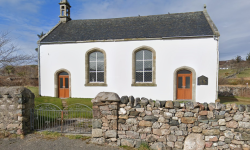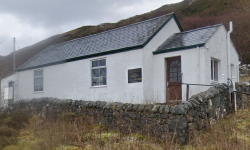Donald MacPherson, Eriboll
The following excerpts are from Dr Kennedy’s The Days of the Fathers In Ross-shire:
“The godly Donald Macpherson was still alive, when my father was in Eriboll, of whom he has often said, that, of all the Christians he had ever known, he was the man who livest nearest to the Lord. Many an hour of sweet profitable converse have they spent together. They have been known to retire to a lonely hillside, and there to spend, in prayer and conversation, a long summer day. It was exceedingly sweet to my father to recall the memories of this eminent saint. He was, in some respects, more like a seer of the days of old, than the ordinary Christian of the present time. His nearness to God in prayer was remarkable. Seldom, did he specially carry one’s case before the throne, without its being so laid open to him, that there was scarce a thought or feeling of the party prayed for, hidden from him by the Lord. Remarkable instances of this might be multiplied.
The well known Robert Macleod, was Donald Macpherson’s devoted disciple. In whatever way Robert was at first awakened, it was through Donald’s blessed instruction he was established in “the truth as it is in Jesus,” and never was a soul more tenderly and wisely nursed, than that of this interesting inquirer. Ardent and honest, he, in his outset, needed a judicious friend; and in Donald Macpherson he found one, who could understand all his peculiarities, and who carried his case so closely under the light from the mercy-seat, that few of his fears and sorrows were hidden from him. No wonder though he venerated this man of God. The story of his first prayer, in Donald’s family, has been often told. To Robert’s bewilderment, his host abruptly asked him to pray at family worship, during a visit which he paid him. He dared not refuse; so, turning on his knees, and addressing his Creator, he said, “Thou knowest that though I have bent my knees to pray to Thee, I am much more under the fear of Donald Macpherson, than under the fear of Thyself.” Donald allowed him to proceed no farther, but, tapping him on the shoulder, said, “that will do, Robert; you have honestly begun and you will honourably end,” and then he himself concluded the service. Poor Robert’s first attempt was not, he himself thought, very encouraging, and he was expressing to his friend his fear that he never could be of any use, in bearing a public testimony for the truth.” Yes, Robert,” his friend soothingly said, “the Lord will open your mouth, to speak the praises of free grace, and, as a sign of this, you will be called thrice to speak, the very first day you are called to speak in public.” Soon thereafter, Robert heard that the communion was to be dispensed in Lochbroom, and that Mr Lachlan was expected to be there. He went on the appointed week, but did not reach the place of meeting at Lochbroom, till after the commencement of the service on Friday. He had not arrived, when Mr Lachlan was opening the question, and yet, strange to say, the minister declared, that he expected a recruit to the ranks of the speakers, that day, from whatever quarter he might come. Robert, just then, made his appearance, and was not long seated, when he was called to “speak to the question.” He did not refuse to rise, but was so embarrassed as to be able to utter only a few hurried words. Towards the close of the service, and after many others had spoken, Mr Lachlan called Robert again, and said to him, “as you were taken by surprise before, you could not be expected to say much, but rise again, and the liberty formerly denied, will be given you.” Robert rose, and delivered a most affecting address, which so delighted the minister, that he called him to conclude the service with prayer. This was Robert’s first public appearance, and he was called thrice to speak; and thus, the sign was given to him, which Donald Macpherson had led him to expect.”
“In 1806, he was called to be assistant to Mr Wm. Mackenzie. minister of Assynt. He had been enabled to decide unhesitatingly, and at once, that it was his duty to accept the offered appointment. What his reasons for this decision were, and how the Lord had revealed His mind to him, there are now no means of ascertaining. But the issue proved that the Lord had indeed taken him by the hand to guide him. No sooner did the people become aware of his intention to remove from Eriboll, than grief and consternation spread over the district. Donald Macpherson was the only one who sympathised with him, being persuaded that the Lord was calling him away. To the rest, and even to the best of the people, it seemed very unlikely that the Lord, who had not ceased to countenance his labours among them, should take him from them in the very midst of his usefulness. For a time, they would listen to no argument on the subject; they wished to retain their minister; they could not see the Lord’s hand in his removal, and, with tears and entreaties, they besought him to reconsider his decision, and still to remain among them. One after another would wait upon him; groups would be watching for him whenever he went abroad; each one whom he met was weeping at the sight of him; and the congregation always now parted in tears. All this was extremely painful to him, but could not move him from his purpose. He knew what the Lord would have him to do, and he was resolved, at any cost, to follow His leading. At last, prayer-meetings were held by the people, and they were brought to ask for direction “from on high;” and, ultimately, they came to a sober and resigned state of mind and feeling. Donald Macpherson’s influence greatly contributed to this result. The night before his departure, a deputation waited on him, and intimated to him that they could no longer oppose his removal, as they believed it was of the Lord, although it was, on that account, more painful to their hearts, fearing, as they did, that by their abuse of the gospel they had sinned it away. All that they now could do, they said, was to cross, as often as they could, the hills between them and the scene of his future labours.”

